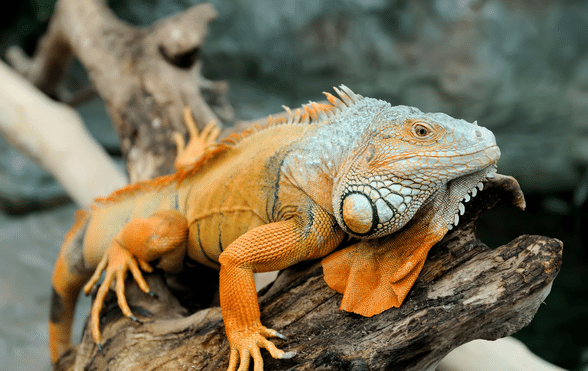Table of Contents
Iguanas are fascinating reptiles that require a carefully balanced diet to stay healthy and thrive. Understanding the feeding requirements for Iguanas is crucial for their overall well-being. This guide covers essential nutritional information and tips to ensure your Iguana receives the best possible care.

Essential Feeding Requirements for Iguanas
1. Understanding Iguana Diet Basics
Iguanas are herbivores, meaning they require a diet primarily composed of plant-based foods. Their natural diet includes a variety of leafy greens, vegetables, fruits, and flowers. It’s important to replicate this diversity in captivity to provide them with all necessary nutrients. For more on Iguana diet basics, visit Cornell University Exotic Pet Nutrition.
2. Leafy Greens
Leafy greens should make up the majority of your Iguana’s diet. Suitable options include collard greens, mustard greens, turnip greens, dandelion greens, and escarole. Avoid spinach and kale in large quantities as they contain oxalates, which can bind calcium and hinder its absorption. For more on leafy greens, see PetMD Foods for Iguanas.
3. Vegetables
In addition to leafy greens, vegetables are an important part of an Iguana’s diet. Offer a variety of vegetables such as bell peppers, squash, zucchini, green beans, and carrots. These should be chopped into manageable pieces and mixed into their daily salad. For more on vegetables, visit The Spruce Pets Feeding Iguanas.
4. Fruits
Fruits should be offered in moderation, making up about 10-15% of your Iguana’s diet. Suitable fruits include mango, papaya, blueberries, strawberries, and melon. Fruits are high in sugar, so they should be given as treats rather than staples. For more on fruits, see Reptiles Cove Iguana Fruits.
5. Calcium and Vitamin Supplements
Calcium is vital for Iguanas to prevent metabolic bone disease. Provide a calcium supplement that does not contain phosphorus, dusting it on their food several times a week. Additionally, a multivitamin supplement designed for reptiles can help ensure they receive all necessary vitamins and minerals. For more on supplements, visit The Spruce Pets Iguana Supplements.
6. Water and Hydration
Ensure your Iguana has access to fresh water at all times. While they may not drink large amounts, they absorb water from their food and through their skin. Mist their enclosure regularly to maintain humidity levels and encourage hydration. For more on water and hydration, see Reptiles Magazine Hydration Tips.
7. Foods to Avoid
Some foods can be harmful to Iguanas and should be avoided. These include animal protein (meat, insects, dairy), high-oxalate vegetables (spinach, beet greens), and high-phosphorus foods. Processed human foods, sugary treats, and foods with pesticides or chemicals should also be excluded from their diet. For more on foods to avoid, visit PetMD Foods to Avoid.
Conclusion on Feeding Requirements for Iguanas
Understanding the feeding requirements for Iguanas is essential for their health and longevity. By providing a balanced diet rich in leafy greens, vegetables, and appropriate supplements, you can ensure your Iguana thrives. Regularly review their diet and consult with a reptile veterinarian to keep their nutrition on track. For more reptile care tips, check out our Reptile Care Guide.
FAQs on Feeding Requirements for Iguanas
How often should I feed my Iguana?
Juvenile Iguanas should be fed daily, while adult Iguanas can be fed every other day. Ensure their food is fresh and varied to meet their nutritional needs.
Can Iguanas eat flowers?
Yes, Iguanas can eat certain flowers like hibiscus, dandelions, and roses. Ensure the flowers are free from pesticides and chemicals before offering them to your Iguana.
How can I ensure my Iguana gets enough calcium?
Provide a calcium supplement without phosphorus, dusted on their food several times a week. Also, include calcium-rich vegetables like collard greens and mustard greens in their diet.
What should I do if my Iguana refuses to eat?
If your Iguana refuses to eat, check their environment for proper temperature and humidity levels, as these can affect appetite. Consult a reptile veterinarian if the problem persists.
Are commercial Iguana foods suitable?
Commercial Iguana foods can be used as part of their diet but should not replace fresh vegetables and greens. Ensure the commercial food is high-quality and formulated for Iguanas.
How do I provide water for my Iguana?
Provide fresh water in a shallow dish and mist their enclosure regularly. Iguanas absorb water from their food and through their skin, so maintaining humidity is crucial.











